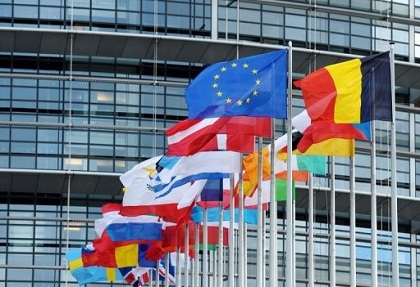EU Proposes New Entry Rules for Balkan Countries

The European Commission proposed a tougher and more political admissions process for new member states Wednesday, in a concession to France which could revive Albania's and North Macedonia's membership hopes.
Serbia and Montenegro, which have begun accession negotiations, will be allowed to continue as before, but their southern neighbors could be forced to revisit some questions they thought were settled.
This will be seen as an attempt to placate France, which had blocked Albania and Montenegro from making further progress even after the European Commission had said they meet the criteria for entry talks.
Brussels will produce a report on Albanian and North Macedonian progress before the end of the month, and wants to confirm they have a future inside the bloc at a Western Balkan summit at the end on May.
But some EU capitals remain skeptical, particularly France, whose minister for European affairs Amelie de Montchalin welcomed the Commission proposal but warned that nothing would be "automatic".
"To open accession negotiations, we need two things," she told AFP after the Commission announcement. "This proposal must be accepted unanimously by the 27 member states without it being watered down."
"And we need to see reality of the reforms that Albania and North Macedonia have been asked to implement. What is done and what remains to be be done."
According to the proposal released by the European Commission, the negotiations could be "put on hold in certain areas... or suspended overall. Already closed chapters could be re-opened or reset."
The Commission's proposal does not alter the basic legal and democratic standard that candidates from the remaining Balkan states must meet in order to qualify for accession talks to the 27-nation union.
- 'Common future' -
But the draft, "Enhancing the accession process: A Credible EU perspective for the Western Balkans", calls for a "stronger political steer" from member state leaders and the candidate governments.
A country must show its candidacy is "not moving on autopilot and must reflect an active societal choice on their part to reach and respect the highest European standards and values.
"Equally, the commitment of the member states to share a common future with the Western Balkans as full members of the Union is a significant political and not simply technical undertaking," the text said.
The European Commission had hoped to allow North Macedonia and Albania to join accession talks in June last year, but France and a couple of other reluctant countries refused to back them.
North Macedonia in particular was dismayed by the delay, having gone through a politically painful name change to appease Greek concerns and unblock its route towards EU and NATO membership.
But many in Paris are convinced that Europe had already expanded too quickly and taken in too many poorer eastern states that have undergone too little social, legal and democratic development.
For President Emmanuel Macron, this clashes with his vision of a more deeply integrated Europe with a clear governing structure.
"If we want a powerful Europe, it has to move faster and be more integrated. That's not compatible with the opening of an enlargement process right now," Macron told The Economist magazine in October.
Macron also expressed specific concerns about the Western Balkans, noting that Bosnia faces a problem of jihadists returning from Middle East wars.
"We need to reform our membership procedures, they’re no longer fit for purpose. They're not strategic. They're not political, too bureaucratic and not reversible," he told the magazine.
Announcing the proposed reform, EU enlargement commissioner Oliver Varhelyi insisted the region's religious and demographic breakdown was not relevant.
Varhelyi told reporters that the Commission's evaluation that Skopje and Tirana were ready for accession talks was "still valid" but that their report would be updated with the "latest developments."



